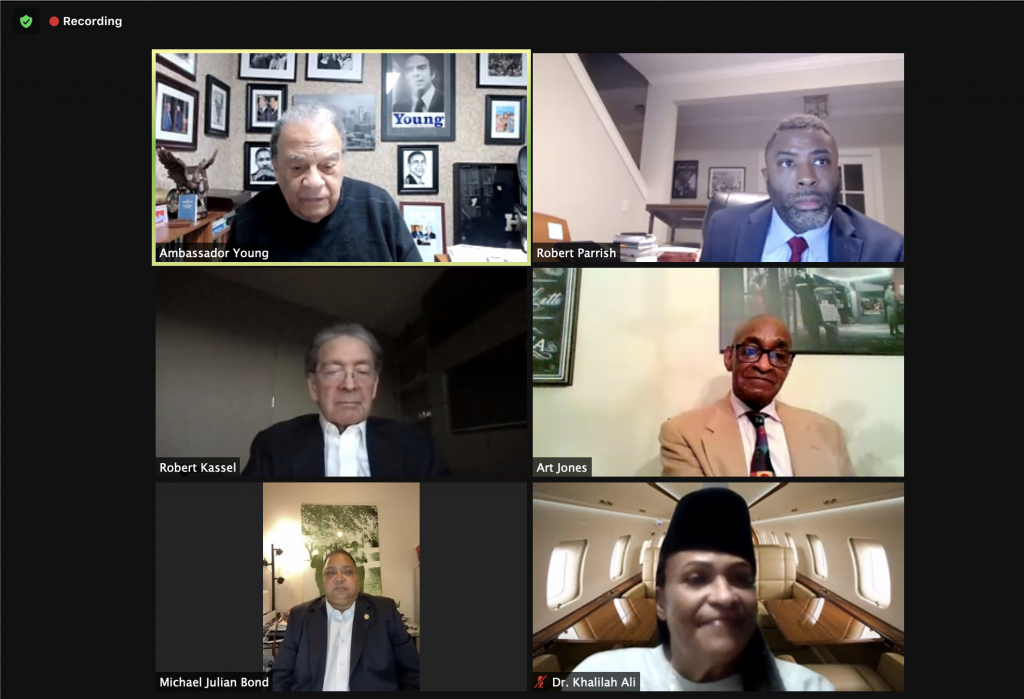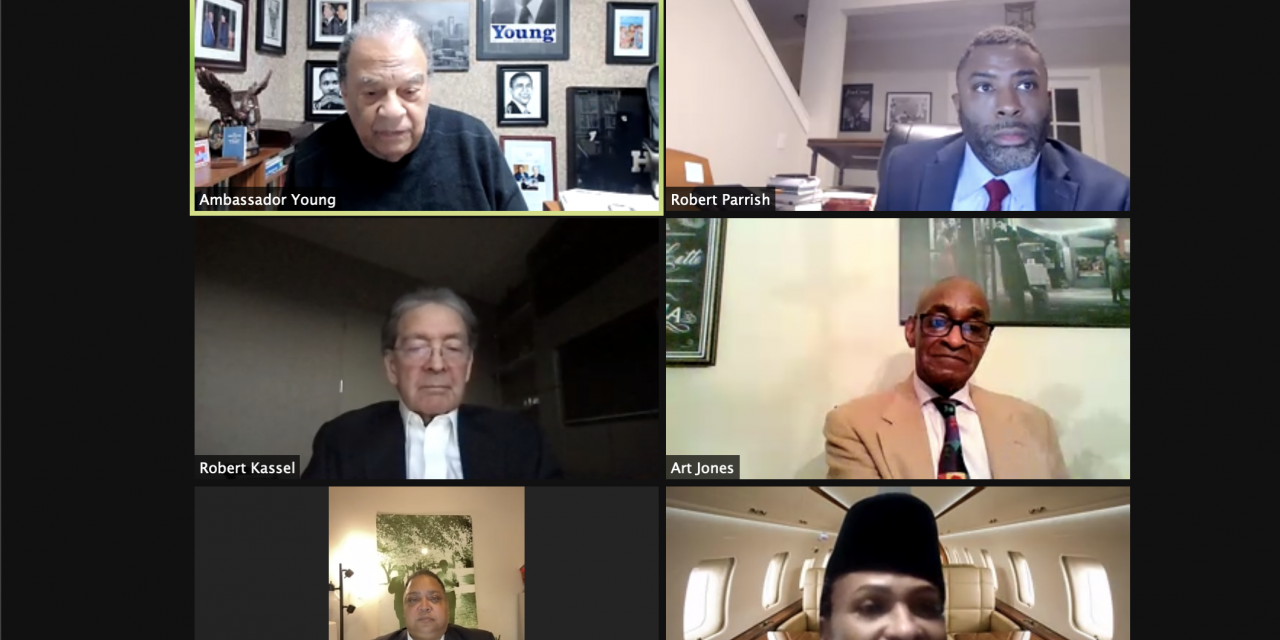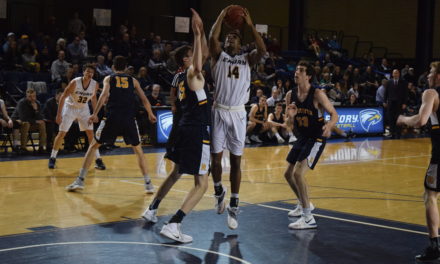The Emory University School of Law and Dream Factory LLC hosted a virtual panel discussion on Jan. 18 about the documentary “Ali’s Comeback: The Untold Story” (2020), which chronicles legendary heavyweight boxer Muhammad Ali’s tumultuous return to boxing in 1970.
The panel featured Ali’s wife Dr. Kalilah Ali, Atlanta City Councilmember Michael Julian Bond, “Comeback” director Art Jones, Emory alumnus Robert Kassel (62C, 63L) and former Atlanta Mayor and Ambassador to the United Nations Andrew Young.
Ali, a devout Muslim, became the subject of national controversy on April 28, 1967 when he refused to enlist in the United States Army after being drafted for the Vietnam War. He declared himself to be a conscientious objector on religious grounds; the United States government retaliated by convicting the twenty-five-year-old Ali of draft evasion, fining him $10,000, sentencing him to five years in prison and banning him from boxing in the United States.
Ali harbored doubts and fears about his potential incarceration, but Ali’s wife convinced him to follow in the footsteps of other devout Muslims and hold true to his religious principles.
“Don’t go into the army,” Kalilah Ali told her husband. “You got to be loyal. You have to stick with it and don’t turn your back . . . That’s the sacrifice you got to make.”
Although Ali was freed on bail and appealed his sentence, he was stripped of his heavyweight championship title and lampooned for his apparent lack of patriotism and courage. Others, however, expressed their support and hailed Ali for his determination to do what he felt was right despite the legal repercussions.
“In 1970, he was the most polarizing individual, not boxer, but individual in America,” Young said. “People either loved him or they hated him.”
Ali needed a boxing license to fight and no state was prepared to grant him one given that the federal government had blocked over sixty previous attempts.
That’s when Kassel, the owner of Sports Action Inc., threw his hat in the ring. Kassel connected with Georgia state Senator Leroy Johnson, the first Black man elected to the state legislature since the Reconstruction era, to help navigate the legal landscape. When Johnson realized that neither Atlanta nor Georgia had a boxing commission which could deny the license, he had one person legally standing in his way: Gov. Lester Maddox, a staunch segregationist. Once Johnson received confirmation of Maddox’s public support of the fight, Kassel put his plans into motion.
He saw an opportunity to capitalize on the Ali controversy and Atlanta’s racial tensions, and proposed that Ali face the reigning heavyweight champion and “Great White Hope” Jerry Quarry.
“There were a lot of haters, quite frankly, in the white community,” Kassel said. “They thought he was a big mouth and a braggart with his poetry and all of his predictions. So we decided, let’s go find a ‘great white hope’ to really stir up publicity.”
Ali’s comeback happened and, more importantly, it happened in Atlanta. At the time, the city was rife with racial tensions, and the sports scene largely championed white athletes and white-dominated sports. At the same time, Atlanta had its finger on the pulse of Black culture, the thriving presence of which made the city the perfect setup for the match between Ali and Quarry.
“Atlanta perceived itself as a city on the rise, a city of change,” Bond said. “You saw Atlanta progressing through coalition politics as seen in the election of Mayor Masell, but right across the street Maddox was resigning as governor who was staunchly segregationist and extreme and conservative. This was a place of contradictions.”
Despite receiving death threats from the Ku Klux Klan, being served with a federal district injunction and learning that Maddox had reversed his initial support in the weeks leading up to the fight, Kassel forged ahead with his preparations.
On Oct. 26, 1970, almost exactly three and a half years after Ali sacrificed his athletic career for his religious convictions, the world watched the match at the Civic Auditorium in downtown Atlanta. Black and white celebrities and societal royalty flocked to the arena, pushing ticket sales to an estimated three million.
“Everybody that had some kind of hustle anywhere in the world seemed to descend on it,” Young said. “Everybody came from everywhere in the country . . . It was the first sports event that put Atlanta on the map.”
Although Ali’s win was anticlimactic – he won on a technical knockout – it symbolized the triumph of his religious freedom, racial identity and athletic prowess over discrimination and hate. The victory was later replicated in the courtroom, when Chauncey Eskridge, Martin Luther King Jr.’s lawyer, spearheaded Clay v. United States in 1971. The Supreme Court voted unanimously to overturn Ali’s convictions.
“Whenever we were in Chicago, we would stay at Chauncey Eskridge’s house,” Young said. “It was a struggle of conscience for [Ali and King]. Neither one of them was trying to get attention or wanted to be heroes.”
Today, Ali is best remembered as what Jones called a “people’s champ,” who voiced the concerns and convictions of many Blacks, Muslims and Americans who were disenchanted with the government’s stance on race and the Vietnam War. He truly embodies his most famous maxim, “float like a butterfly, sting like a bee.” He could be forthright and outspoken when necessary, but was by all accounts a down-to-earth, humble husband, father and friend.
“He was a lovable figure,” Young said. “For every hater there was an admirer. He had a wonderful sense of humor, and he never took himself too seriously.”

The panelists during the “Ali’s Comeback: The Untold Story” panel discussion on Jan. 18. (Claire Fenton/Asst. Sports Editor)
Claire Fenton (she/her) (24C) is a Pittsburgh native majoring in quantitive sciences and linguistics. Outside of the Wheel, she is the treasurer of Emory Data Science Club and Girls Who Code. When she’s not training for half marathons, you can find her watching the Penguins dominate the Philadelphia Flyers and reading Agatha Christie novels.






